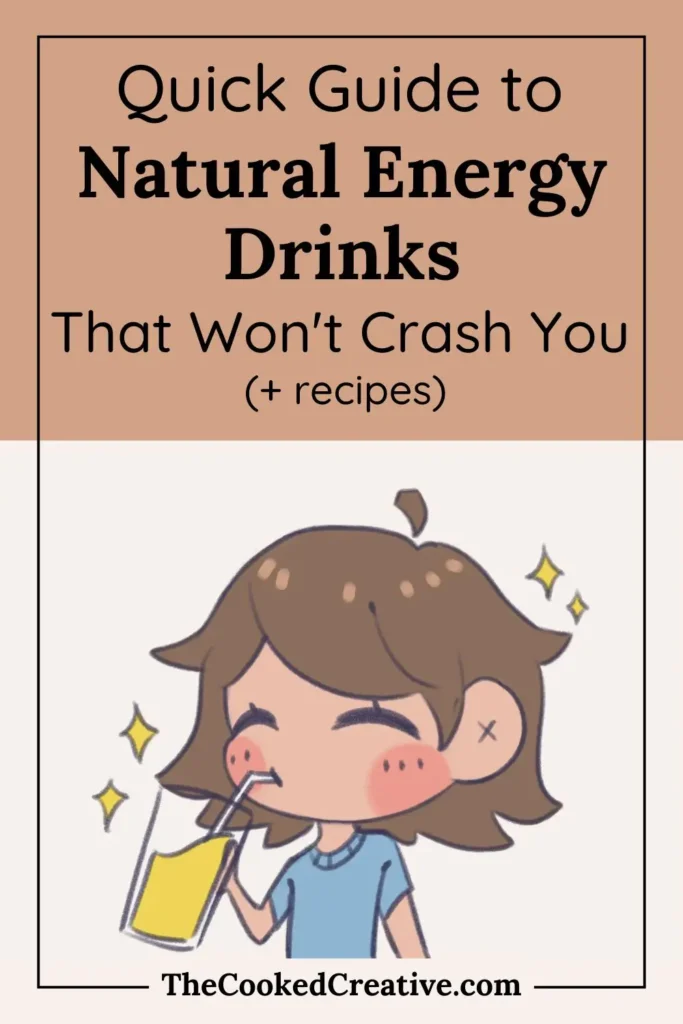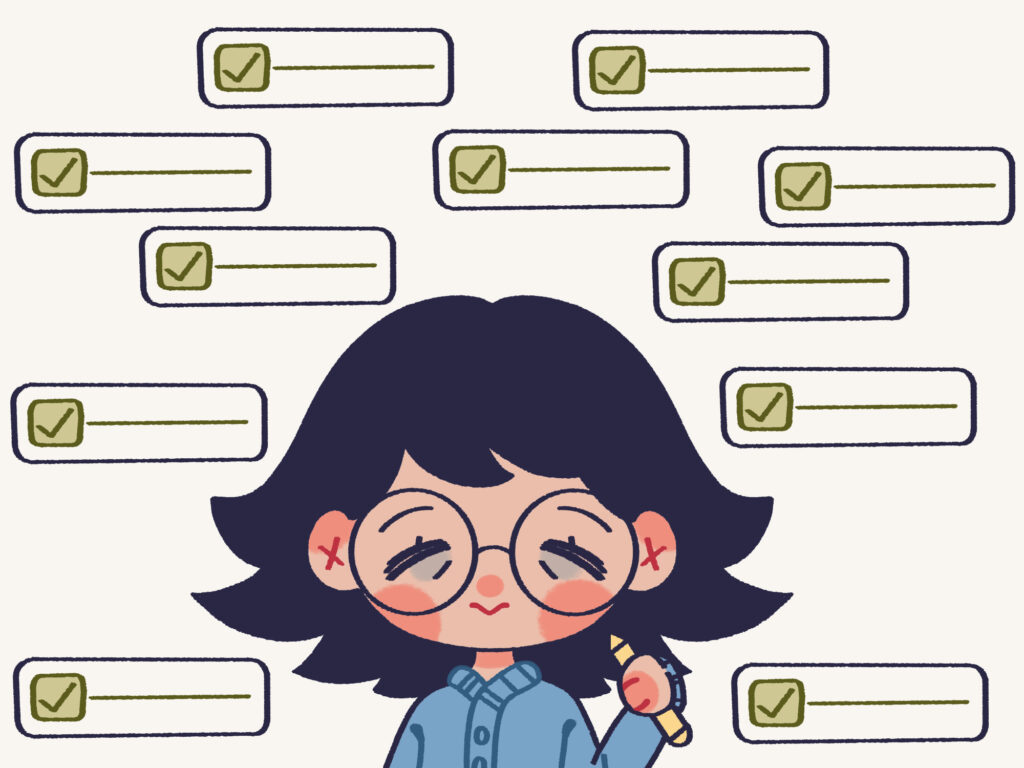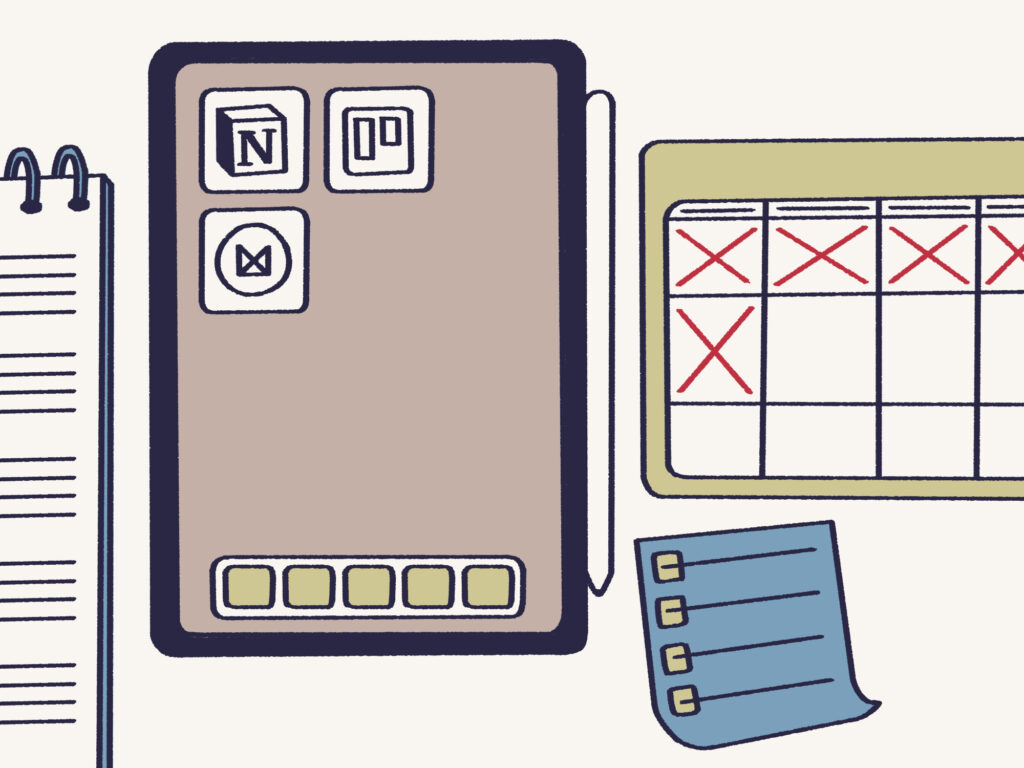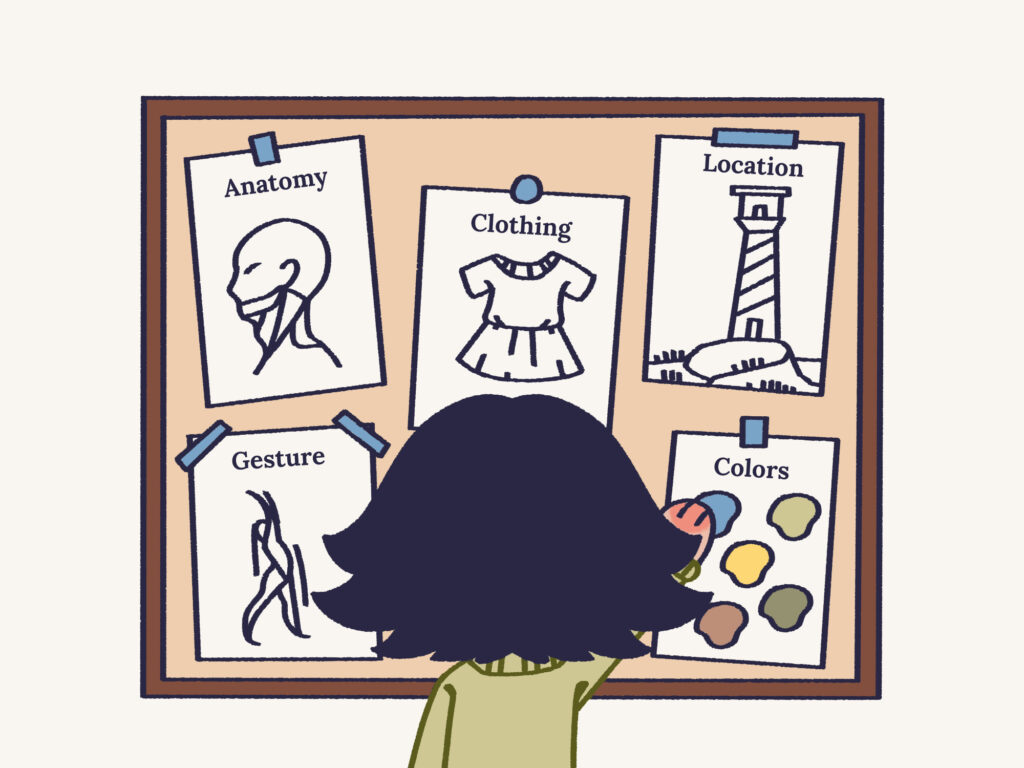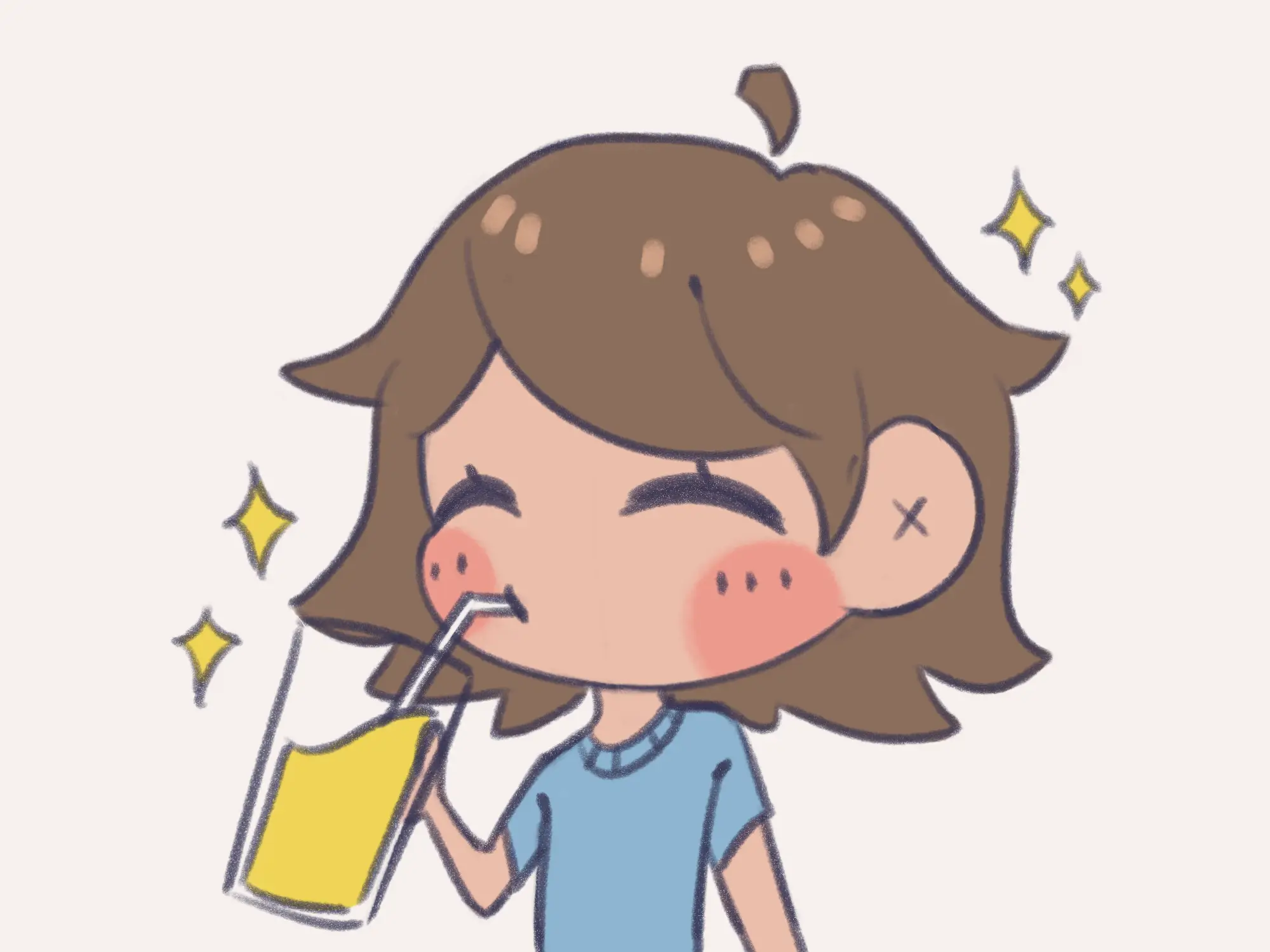
Quick Guide to Natural Energy Drinks That Won’t Crash You (+ recipes)
As a creative or content creator, maintaining energy levels throughout the day is ESSENTIAL. Long hours spent designing, writing, or producing can quickly drain your energy reserves, and it’s tempting to reach for a quick-fix energy drink. However, turning to your 5th cup of coffee or a conventional energy drink often leads to a familiar cycle: a quick boost followed by a sudden crash that leaves you feeling more drained than before. Sometimes, they don’t even work as intended—personally, I find coffee makes me sleepier rather than more awake. That’s where natural energy drinks come into play. These alternatives offer a healthier option to sustain your energy.
Unlike their traditional counterparts, which are often loaded with artificial ingredients and high levels of caffeine (combined with other harmful chemicals that have been linked to serious health issues) natural energy drinks harness the power of plant-based ingredients to provide a steady stream of energy. These drinks offer a healthier alternative, packed with nutrients that support both your body and mind, helping you stay focused and energized without the jitters or the dreaded crash.
In this post, we’ll explore how natural energy drinks can become your secret weapon for sustained creativity, offering you the boost you need without compromising your health or productivity.
Let’s talk about sugar, shall we?
When I mention “energy boost,” you probably think of two things: caffeine and sugar. Don’t worry, I’ll cover caffeine in a later section—let’s focus on sugar and high glycemic index (GI) foods for now.
The GI, or glycemic index, measures how quickly our bodies absorb the energy from the carbohydrates in our food and drinks. Carbs are essential because they break down into glucose (glucose = energy) to fuel your brain, organs, and muscles.
High GI foods, like sugar (a simple carbohydrate), are absorbed quickly into our bodies, giving you a fast energy boost. However, this quick surge is often followed by a sharp decline, known as a blood sugar crash.
If you’re interested in knowing the GI of certain foods, I suggest checking out Glycemic-Index !
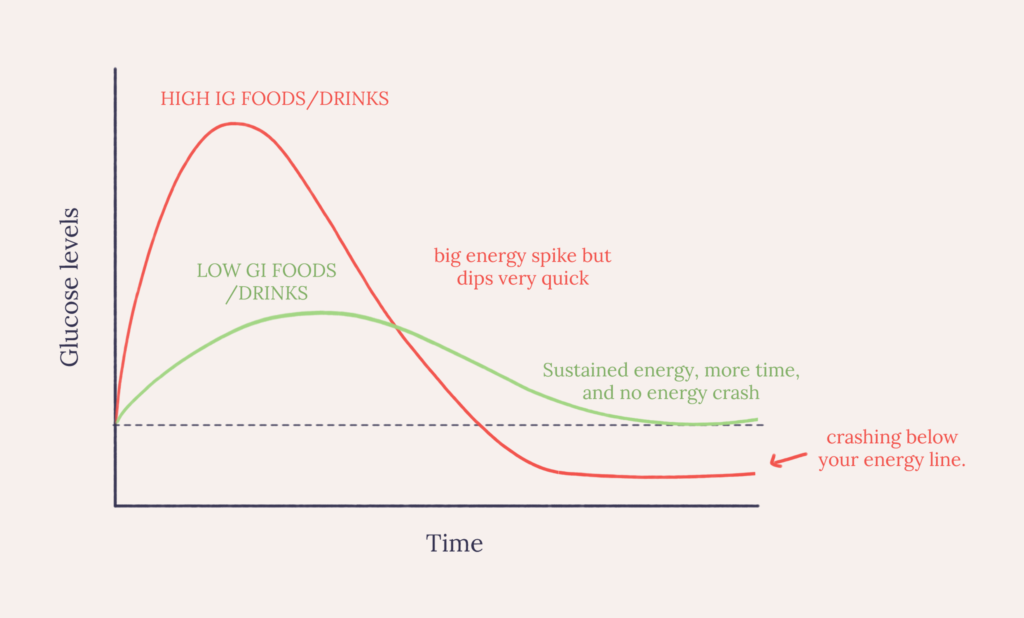
If you need to sweeten your drink, agave syrup is lower on the GI scale. You can also try adding dates to smoothies. Honey is in the middle but offers extra benefits like reducing inflammation.
This is important to know as we go along, we’re trying to avoid a sugary energy crash as well as increase alertness. Avoiding sugary drinks is one part of the equation!
Why Choose Natural Over Conventional Energy Drinks?
Choosing natural over conventional energy drinks can significantly impact your focus and productivity. Beyond their immediate effects, conventional energy drinks come with a range of health downsides, which I’ll explore below
The Downsides of Conventional Energy Drinks
- While caffeine itself is generally safe for most adults (up to 400 mg per day—note that a venti cup at Starbucks contains about 410 mg), combining it with taurine, added sugars, and stimulant herbal extracts could be a recipe for disaster. more is not better.
- Caffeine alone can make you anxious or jittery, but the combination of stimulants in these drinks can cause blood vessels in the brain to spasm and restrict blood flow, potentially leading to a hemorrhage.
- It may also have cardiovascular effects, such as increased heart rate and blood pressure. High blood pressure is the leading risk for a stroke.
- High sugar content is another issue. A single 16-ounce can contain between 54 and 62 grams of sugar, exceeding the recommended maximum for an entire day, and it can contribute to obesity and type 2 diabetes if you consume them regularly.
- Remember our discussion on sugar? Energy drinks provide a quick boost but often leave you feeling worse than before.
- A study in Sweden showed a strong relationship between energy drinks and tooth decay, later demonstrated in American children. low PH + a whole lotta sugar = tooth erosion.
- PLEASE do not mix them with alcohol. Energy drinks can mask the effects of alcohol, leading you to drink more, which can result in harmful consequences.
- Other potential symptoms include anxiety, depression, diarrhea, hallucinations, headaches, mood swings, nausea, and tachycardia.
The Advantages of Natural Energy Drinks
- First of all, you’re avoiding all of THAT up there.
- You have control over what you’re drinking and the individual ingredients, allowing you to experiment with what works best for you and adjust what doesn’t. This also means you can choose high-quality ingredients.
- Besides the energy boost we’re looking for, these drinks tend to be rich in antioxidants, vitamins, and minerals.
- With the right ingredients, you can achieve sustained energy. While carbs are essential for energy production, the TYPE of carbs you consume makes a significant difference.
Natural Energy Drink Recipes
I’ve broken down this section into four categories. Energy-boosting drinks work in different ways—they can provide sustained energy through carbohydrates, help prevent dehydration, offer caffeine, or aid digestion after a large meal and the fatigue that follows.
Depending on what you need, any of these four categories can help you achieve optimal energy levels for your creative work!
Caffeine
Caffeine is one of the most widely used stimulants in the world, and it’s easy to see why. For many creatives and content creators, a morning cup of coffee or an afternoon pick-me-up is a go-to solution for boosting alertness and jumpstarting productivity. but how does it work?
Our body produces Adenosine, a neurotransmitter that makes us sleepy and relaxed. Adenosine levels increase the longer we stay awake, eventually making us feel tired at night. Caffeine blocks adenosine, providing a temporary break from sleepiness and keeping us alert. It also stimulates the release of adrenaline, which enhances concentration and motivation.
Caffeine sources include coffee, matcha, black or green tea, yerba mate, and chocolate.
There are two key considerations for using caffeine effectively:
- Quantity. Moderate amounts of caffeine have been shown to help with mood and cognitive performance, an adult can tolerate up to 400mg of caffeine per day. It depends on how much caffeine you drink regularly and your tolerance to it, but 100 to 400mg is the sweet spot.
- Timing. Most people should stop drinking coffee around 6 to 8 hours before bed, depending on your caffeine sensitivity, could be a little more or a little less. When it comes to energy, and anything else for that matter, sleep is KING. Drinking coffee too close to bedtime can disrupt your sleep, leading to fatigue the next day and potentially causing you to consume more caffeine, which could further impact your sleep.
If coffee gives you the jitters, consider switching to matcha. Coffee releases caffeine rapidly, leading to a quick boost and a harsh crash. Matcha, on the other hand, releases caffeine more slowly and gently, providing a more sustained energy boost that lasts 3 to 4 hours without a sudden crash.
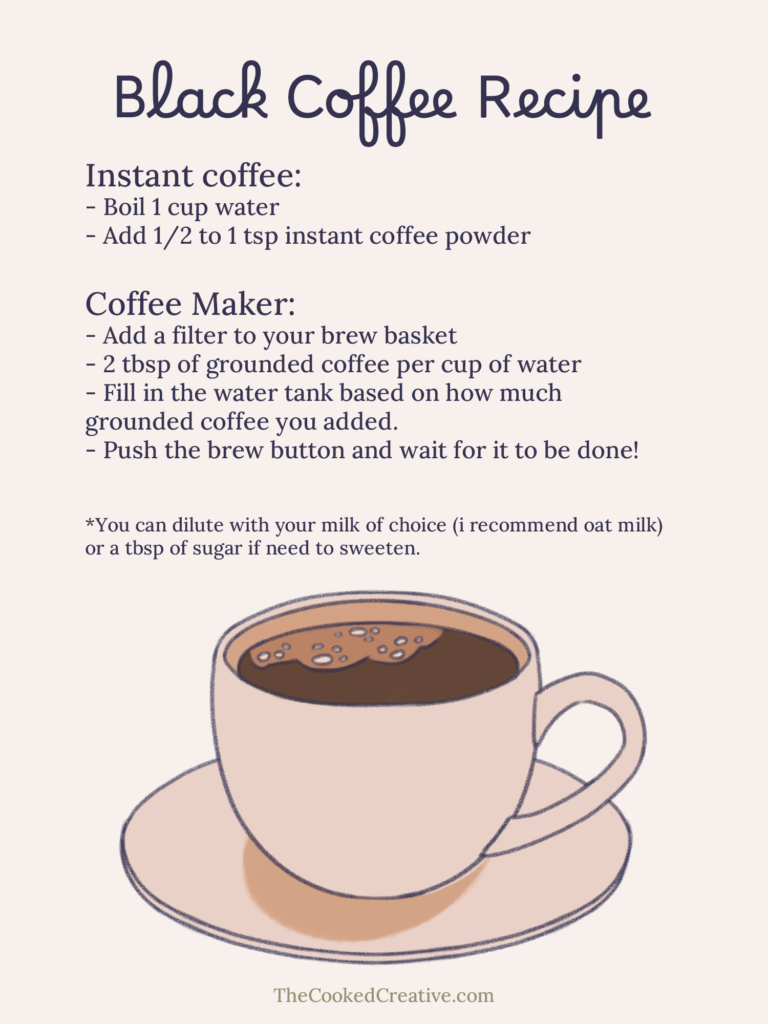
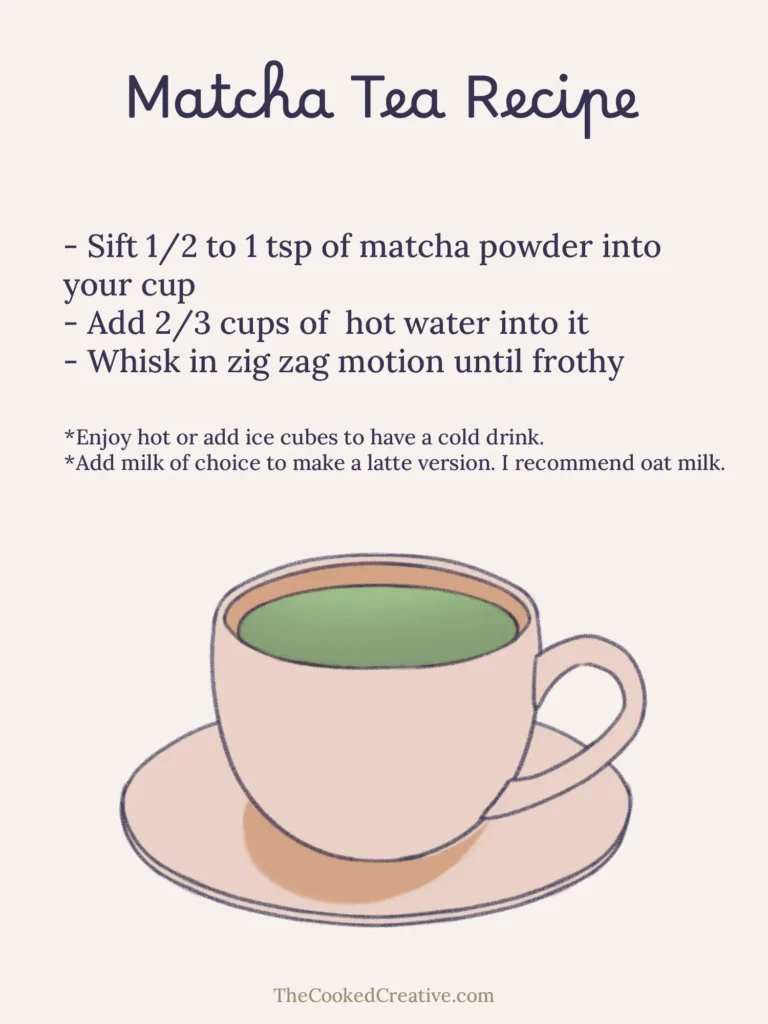
If you need a pick-me-up later in the afternoon, keep reading for more options!
Hydration
Fatigue can be a symptom of dehydration. If you’re not drinking enough water or fluids, you might feel sluggish both mentally and physically. Water plays a crucial role in regulating body temperature, transporting nutrients and oxygen to cells, and removing waste products. When you’re dehydrated, your body has to work harder to perform these essential functions, which can lead to a drop in energy. Even mild dehydration can result in fatigue and decreased focus.
If you haven’t had a cup of water in a few hours, a glass of water will perk you up immediately.
Struggling to drink enough water? I have some tips to help you add flavor to your water, making it more enjoyable and helping you build the habit of staying optimally hydrated.
Add these ingredients to your water bottle!
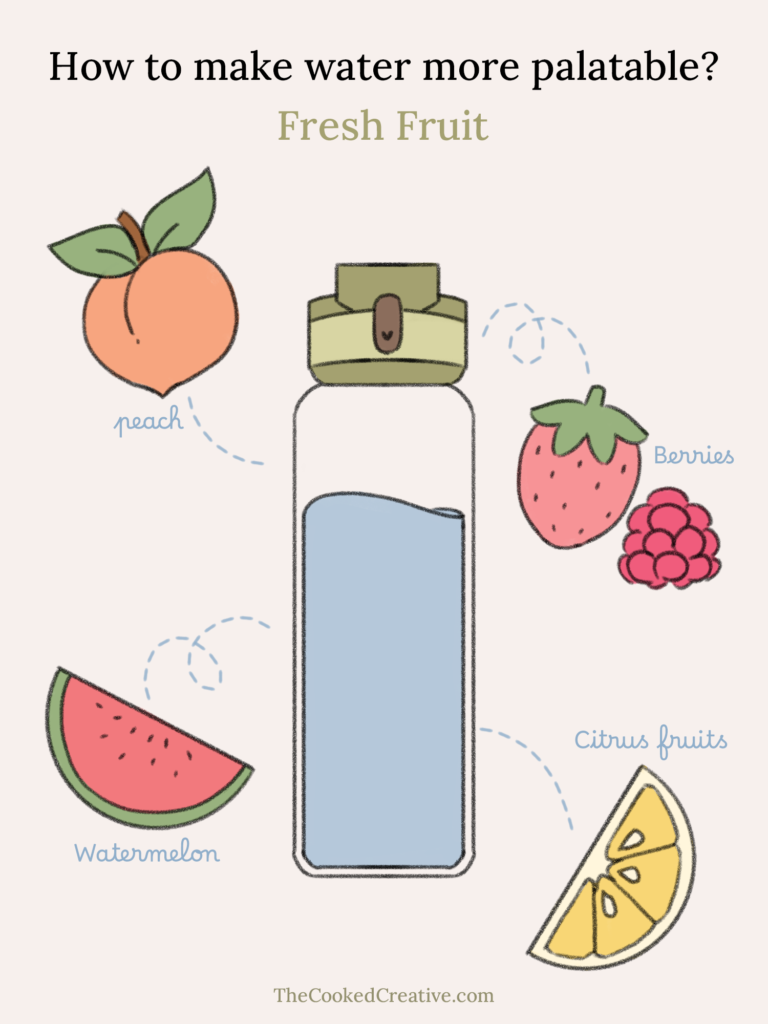
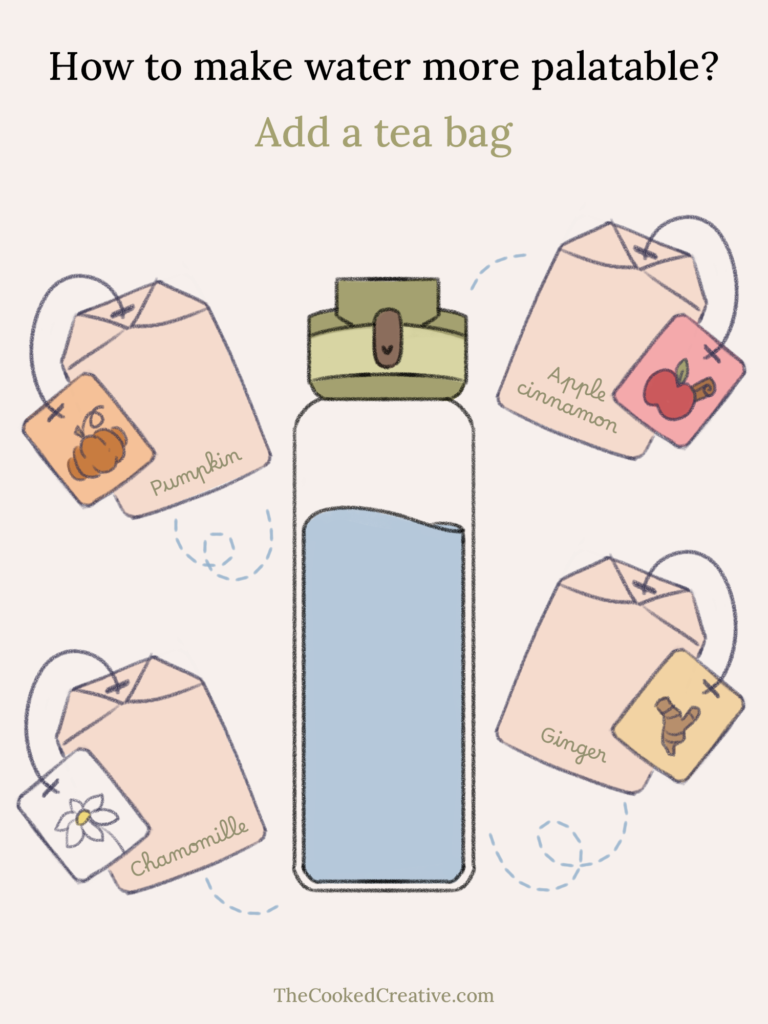
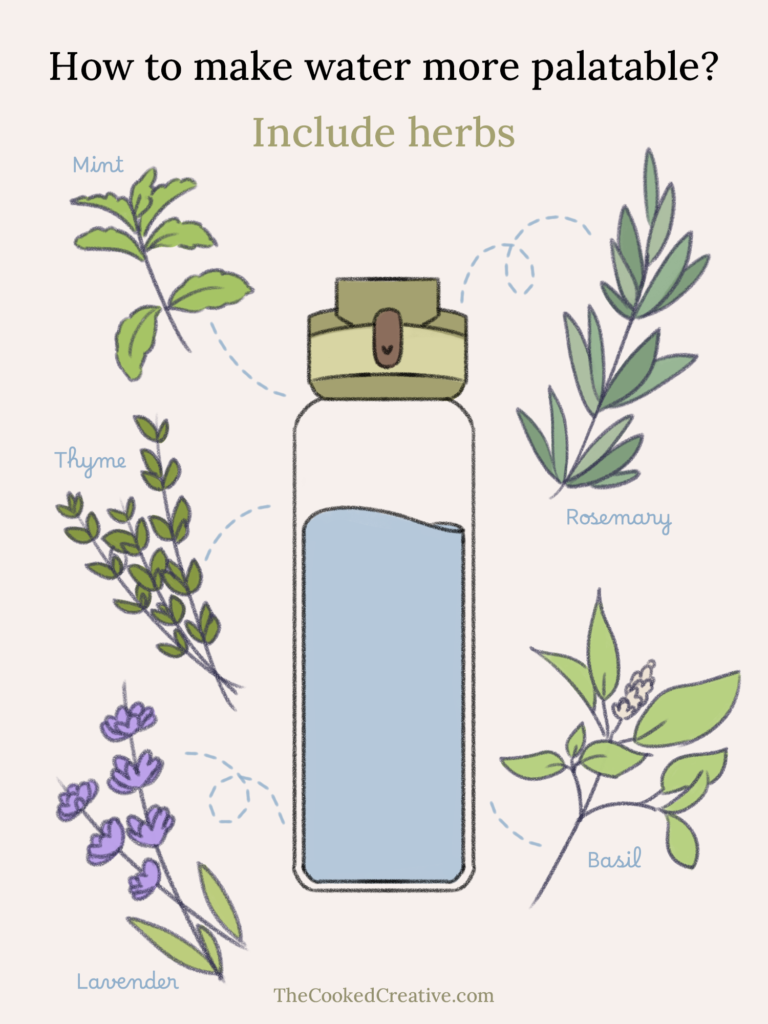
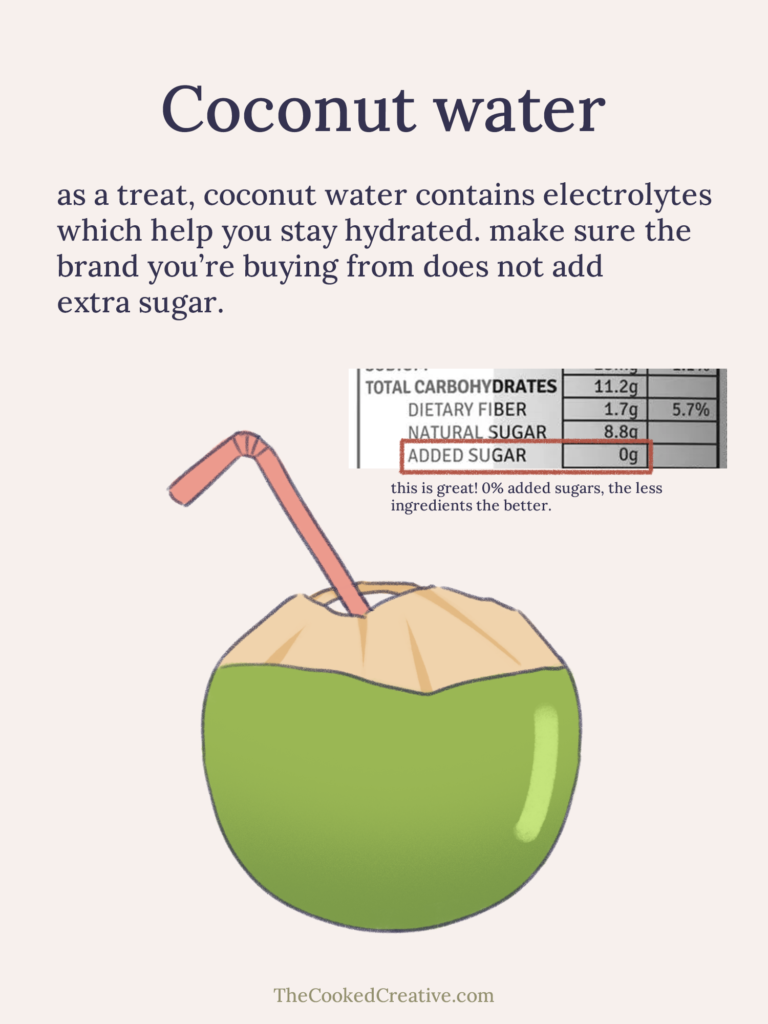
Fruit
Fruits are not only delicious and refreshing but also one of the best natural sources of sustained energy. They are packed with natural sugars, primarily fructose, which is easily converted into glucose (remember, glucose = energy) for your body to use. Unlike refined sugars found in energy drinks or candy, which quickly enter your bloodstream and cause an energy roller coaster, fruit sugars are accompanied by fiber. This fiber slows down the digestion of sugars, releasing them slowly and steadily, providing a sustained energy supply rather than a sharp spike and crash.
In addition to fiber, fruits contain essential vitamins, minerals, and antioxidants that are beneficial for your body. Some fruits, like bananas, are rich in electrolytes, while others like watermelon have high water content, both of which help keep you hydrated.
While I recommend eating whole fruits, fruit-based drinks can also provide a healthy, quick, and easy energy boost.
Caution: Most pre-made fruit juices from the store contain added sugars. The amount of added sugar in these juices can be comparable to that in sodas and soft drinks. Additionally, the fiber found in whole fruit is typically lost in the pulp during processing. For this reason, avoid store-bought fruit juices and opt for homemade smoothies instead, where you use whole fruit chunks and retain all the nutrients and fiber.
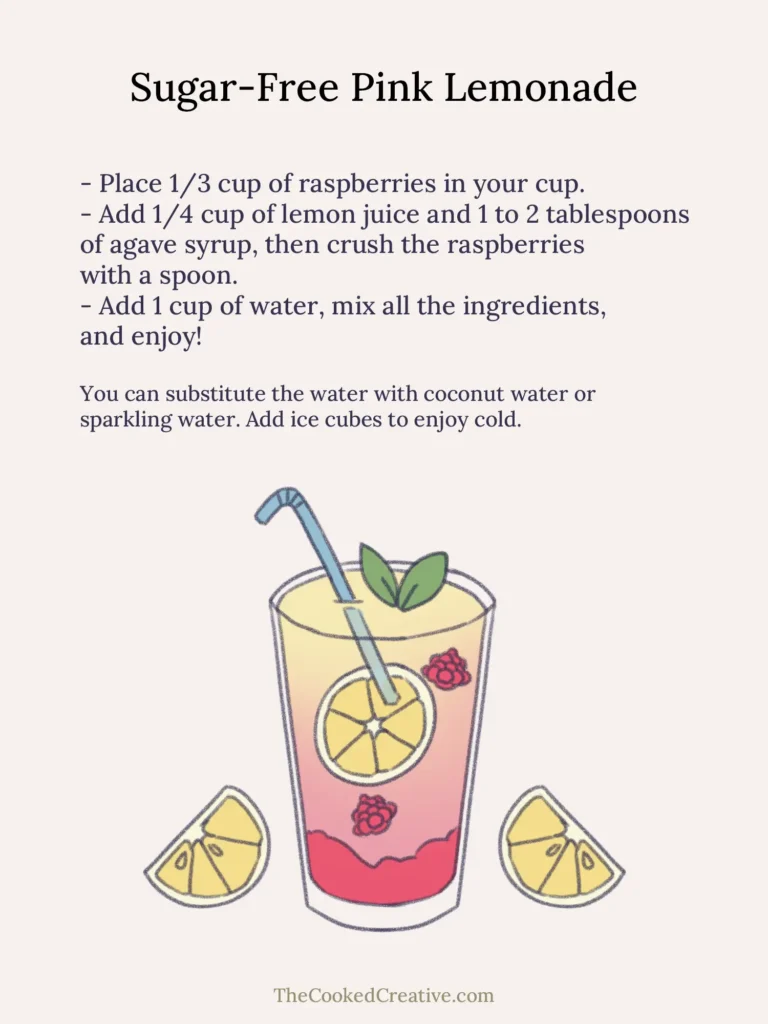
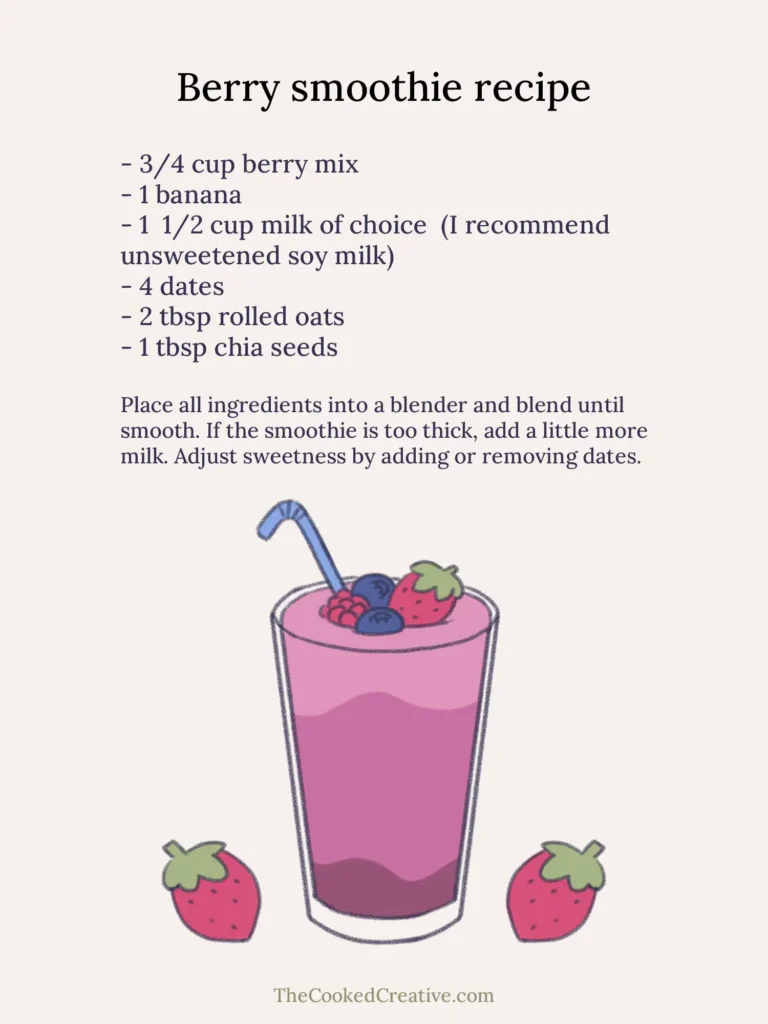
Digestive aid
We’ve all experienced that sluggish, uncomfortable feeling after indulging in a big meal. While it’s natural to feel full after eating, poor digestion can lead to bloating, discomfort, and fatigue, making it harder to stay focused and productive. Fortunately, there are several drinks that can help kick-start your digestive system, alleviate discomfort, and promote smoother digestion after a feast.
TEA
ginger: Ginger contains gingerol and shogaol, which have anti-inflammatory properties that help reduce bloating, relieve gas, and aid digestion. Sipping warm ginger tea after a heavy meal can help break down food and ease nausea or indigestion.
Peppermint: The menthol in peppermint has a calming effect on the digestive tract muscles, helping to relieve gas, bloating, and cramps. It also promotes the flow of bile, which is essential for digesting fats.
Fennel: Fennel contains compounds like anethole that help relax the muscles in the digestive tract, reducing cramps and improving the passage of food and gas. Sipping on fennel tea after a heavy meal can help ease bloating, support digestion, and freshen your breath.
Tips for Maximizing Energy from Natural Drinks
Incorporating natural energy drinks into your routine can help maintain steady energy levels throughout the day, but they are not a magic potion. Here are some best practices to help you maximize the energizing effects of these drinks and keep your productivity high.
- Get moving. If you’re feeling sluggish, exercise is the last thing on your mind. However, moving your body gives you energy in 3 different mechanisms. Exercise prompts your body to make more mitochondria in your muscle cells and the more mitochondria you have, the more energy your body can produce. It also increases oxygen circulation to your body, allowing you to use energy more efficiently. And the boost you get from exercise increases hormones that make you feel more energized. Besides improving your energy, exercise helps you sleep better too!
- Eat low GI foods. Whole grains and fiber-rich foods take longer to digest, releasing energy gradually and steadily giving you a more sustainable energy supply. avoid sugary foods, highly processed flours like white bread, and “instant” foods like instant noodles and instant oatmeal.
- Control your stress levels. Stress-induced emotions consume huge amounts of your energy. You can try meditation, yoga, talking to a friend, or seeking professional help.
- Get enough sleep. repeat before me. SLEEP IS KING. please do not sacrifice your sleep for anything. One sleepless night because you had to meet a deadline is okay, but chronic sleep deprivation is detrimental. Avoid long naps during the day (power naps are okay! 10-20 mins), restrict screens before your bedtime, have a wind-down routine and sticking to a consistent sleep schedule can help.
>> Further reading: How to Create a Simple Sleep Routine for Odd Work Schedules
Wrapping it up
Lots of info here!! Let me break it down into actionable steps for you.
- avoid conventional energy drinks and sugary drinks like sodas or grocery store fruit juices
- Make sure you are properly hydrated to avoid fatigue.
- use caffeine to your advantage. not more than 400mg per day and stop drinking coffee 6-8 hours before bedtime. if coffee makes you jittery, try matcha for its slow-releasing caffeine method.
- Fruits are one of the best energy-giving little miracles of earth, eat or make a fruity drink to give you an energy boost once caffeine is off the table.
- if you’re feeling too full to work after a meal, try digestive tea to get your energy back.
- beyond these drinks, make sure you’re exercising, controlling your stress levels, eating low GI foods, and getting enough sleep to get optimal energy levels throughout your day.
Everyone’s body is different, so the key is to experiment with various options and find what works best for you.
I’d love to hear from you! Share your favorite natural energy drinks or tips for staying energized in the comments. Let’s inspire each other to stay healthy, energized, and creative!!
If this article made things easier for you, I’d love it if you shared it with your friends and anyone who might need it!
Dont forget to follow me on social media for fun sneak peeks, behind the scenes and art! links on the sidebar.
Feeling Inspired? Here’s Some Extra Fun Stuff!
- Top 10 Ways to Maximize Your 10-Minute Work Breaks
- Boost Your Daily Step Count with These Work from Home Tips
- Guilt-Free Gaming: How To Enjoy Games Without Regret
Don’t Forget to Pin This for Later!
